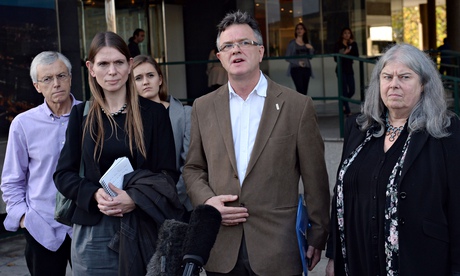Victims Tell Butler-sloss: Don’t Blame US for Child Abuse Inquiry Mistakes
By Rowena Mason
Lady (Elizabeth) Butler-Sloss, the high court judge forced to stand down as chair of the government child abuse inquiry, has been criticised for suggesting survivors could cause problems with the investigation. Peter Saunders, the chief executive of the National Association for People Abused in Childhood (Napac), hit back after Butler-Sloss warned it would be difficult to find a chair for the inquiry who was sufficiently removed from the establishment to satisfy victims’ groups. Both Butler-Sloss and the City lawyer Dame Fiona Woolf resigned from the role after survivors of abuse objected to their links to senior Westminster politicians. Saunders said Butler-Sloss was wrong to imply survivors were holding the government hostage over the selection of the chair, when it was the Home Office that had made two bad choices. Survivor groups just wanted to get to the truth and for the process to be overseen by an appropriate candidate with no conflicts of interest, he said. Butler-Sloss stepped down in July because her late brother, Sir Michael Havers, had been attorney general in the 1980s and his actions would have been subject to investigation by the inquiry. Her successor, Woolf, was also forced to resign because she was a friend and neighbour of Leon Brittan, who was home secretary at the time of the alleged child abuse. Speaking on BBC Radio 4 on Wednesday, Butler-Sloss said she worried that “the victims and survivors, for whom I have the most enormous sympathy – and as a judge I tried a great many child abuse cases – for them to be deciding who should be the person chairing it creates real problems”. She suggested that anyone qualified to chair such an inquiry would have experience that would lead them to be branded as being part of the establishment. “If you do not have in the past a position of authority, how are you going to be able to run the inquiry? You are going to need someone who knows how to run things and if you get someone with an obscure background with no background of establishment, they will find it very difficult and may not be able to produce the goods.” She said the normal processes of sifting of evidence and neutrality between accuser and accused might go by the board if the victims were allowed to dominate. “Of course the victims are at the centre of this, as [the home secretary] Theresa May said – it is hugely to her credit that she wanted this inquiry – but if the victims are to run it, then there will be real difficulties.” Saunders said the problem was not that Butler-Sloss and Woolf were members of the establishment but that they had inappropriately close connections to politicians whose actions were likely to be scrutinised by the inquiry. “Butler-Sloss mentioned something about it inevitably going to be an establishment-type figure. I don’t think we have a problem with that. It is simply that they should do their due diligence before appointing someone … Theresa May, at the end of the day, will make the decision. She is not stupid and would do worse than to run it past the people at the heart of the thing … “Butler-Sloss is being unfair to imply the Home Office is being held hostage by us. We want to help. All survivors want is to get to the truth.” The shadow Home Office minister Diana Johnson also criticised Butler-Sloss’s comments, made on Wednesday as guest editor on the Today programme. “Those with authority to run CSA inquiry do not only come from judiciary and establishment. Very concerned by narrow thinking of Butler-Sloss,” Johnson tweeted. Butler-Sloss’s resignation statement said: “It has become apparent over the last few days … that there is a widespread perception, particularly among victim and survivor groups, that I am not the right person to chair the inquiry. It has also become clear to me that I did not sufficiently consider whether my background and the fact my brother had been attorney general would cause difficulties. “This is a victim-orientated inquiry and those who wish to be heard must have confidence that the members of the panel will pay proper regard to their concerns and give appropriate advice to government. Having listened to the concerns of victim and survivor groups and the criticisms of MPs and the media, I have come to the conclusion that I should not chair this inquiry and have so informed the home secretary.”
|
.
Any original material on these pages is copyright © BishopAccountability.org 2004. Reproduce freely with attribution.
